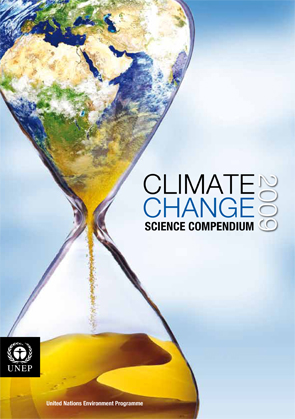
Climate Week 2009, as celebrated in New York at the UN, failed to produce a much needed breakthrough in negotiations leading up to COP15 in Copenhagen this December where the successor to the Kyoto Protocols will be finalized. The meeting of world leaders in New York did not result in any significant forward movement on international agreements to reduce greenhouse gas (GHG) emissions which are driving global warming. President Obama continues to proclaim the urgency of addressing anthropogenic climate change while offering no specific goals, targets, or policies to reduce carbon emissions. His administration is sending signals that there will be no consensus agreement in Copenhagen, placing the blame on the US Congress which has yet to pass any legislation to regulate GHG emissions. In light of the new United Nations Climate Change Science Compendium Report 2009 (UNEP) 2009, it is imperative that a consensus treaty be reached in Copenhagen.
The UNEP report confirms what many of the world's leading climate scientists have been saying with ever increasing urgency; climate shift mechanisms are accelerating at a far faster rate than anticipated just two years ago. We are witnessing the rapid deterioration of the earth's biosphere and a global temperature increase of 6.3 degrees this century is now likely, unless aggressive action is taken immediately. The consequences for life on this planet will be devastating. A maximum rise of 2 degrees is generally accepted as the limit before catastrophic climate change is certain.
The scientific evidence is incontrovertible; the life support systems which have created a stable global biosphere now signal a cascading collapse, caused by GHGs and other human activity. The sixth great extinction is gathering momentum and it would seem human political systems are incapable of action which could prevent the worst case scenarios from happening.
The UNEP 2009 report indicates that climate tipping points, which will result in irreversible accelerating changes to the planetary ecosystem, have already been been reached and possibly surpassed.
The range of 1.4 to 4.3 degrees Celsius in the committed warming
overlaps and surpasses the currently perceived threshold range of 1-3
degrees Celsius for dangerous anthropogenic interference with many of
the climate-tipping elements such as the summer Arctic sea ice, Himalayan
glaciers, and the Greenland Ice Sheet.
Researchers suggest that 0.6 degrees Celsius of the warming we committed
to before 2005 has been realized so far. Most of the rest of the
1.6 degrees Celsius total we have committed to will develop in the next
50 years and on through the 21st century. The accompanying sea-level
rise can continue for more than several centuries. Lastly, even the most
aggressive CO2 mitigation steps as envisioned now can only limit further
additions to the committed warming, but not reduce the already committed
GHGs warming of 2.4 degrees Celsius (Ramanathan and Feng, 2008).
Governments, business, and citizens continue to operate under the false model that we can continue with business as usual and react quickly if these end-of-the-world forecasts prove accurate. This is foolish in the extreme for any number of reasons, not the least of which is that the world's oceans require over 1000 years to cycle temperature increases due to CO2 and climate warming. Susan Solomon and the team at NOAA in Boulder provided conclusive evidence of the ocean's long term retention of temperature increases earlier this year.
Continuing carbon dioxide emissions in the future means further irreversible effects on the planet, with attendant long legacies for choices made by contemporary
society (Ramanathan and Feng 2008).
We have already committed our civilization to considerable deficits in how Earth
Systems respond. These dangers pose substantial challenges to humanity
and nature, with a magnitude that is directly linked to the management
practices we choose to retreat from further tipping points and irreversible
changes from GHG emissions (Lenton et al. 2008, Solomon et al. 2009).
COP15 may very well be the last chance for the world to reach a consensus on measures to reduce GHG emissions and avoid climate chaos for the next millennium. Bill McKibben whose organization 350.org is advocating for the reduction of CO2 concentration levels in the Earth's atmosphere to a "safe level" of 350 Parts Per million (PPM) from present levels of 390PPM, said " The political system is not producing at the moment a result which has anything to do with what the science is telling us."
One of the world's foremost climate scientists James Hansen (who first sounded the alarm on climate change 20+ years ago) said, "Those who lead us have no excuse -- they are elected to guide, to protect the public and its best interests. Only in the past few years did the science crystallize, revealing the urgency. Our planet is in peril. If we do not change course, we'll hand our children a situation that is out of their control. One ecological collapse will lead to another, in amplifying feedbacks."
It is abundantly clear that the world's leaders must take action to reduce anthropogenic climate change while there remains some chance of averting all out ecolypse. The time for preventive measures has passed, it is now time for emergency action.
